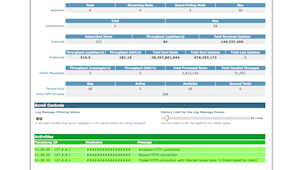Lightstreamer vs Socket.IO
This Lightstreamer vs Socket.IO comparison was created based on reviews from developers and our best attempts to perform analysis by looking at documentation and other publicly available resources.
Easily build complete, trusted realtime functionality.
Take our APIs for a spin Lightstreamer |  Socket.IO | |
|---|---|---|
| Getting started and developer experience | ||
Time to "hello world" Reviewed by 3+ independent developers Ratings were given based on the average amount of time it takes to sign up to a new account and publish the first message. | 2 / 5 5 = <30 min | 4 / 5 5 = <30 min |
Demos / Tutorials A selection of online demos and tutorials so you can test and see the code in action. Explore Ably's tutorials for our pub/sub messaging platform | ||
Documentation Reviewed by 3+ independent developers Explore Ably's documentation for our pub/sub messaging platform | 2.50 / 5 Getting started guides / 5 Information architecture and developer journey / 5 API reference documentation / 5 Readability, design and navigation / 5 Quality of code / 5 Breadth and quality of tutorials / 5 “Lightstreamer documentation is overall disappointing. First of all, it’s all over the place in terms of format: from GitHub READMEs to the most basic of HTML pages to PDFs. There’s even a slide deck. Resources are seldom cross-linked, which makes the docs hard to follow. The entire design of the website is from the last century. It’s aesthetically hideous, and the navigation experience is underwhelming. The only positive things are the API reference, which is quite comprehensive, and the GitHub tutorials, which are explained well.“ | 4 / 5 Getting started guides / 5 Information architecture and developer journey / 5 API reference documentation / 5 Readability, design and navigation / 5 Quality of code / 5 Breadth and quality of tutorials / 5 "Much like the solution, the documentation is pretty lightweight. You have an excellent getting started guide that requires no prior Socket.IO or Node.js knowledge. There are tens of code snippets throughout the docs, which is fantastic. There are almost no tutorials (not official ones), but you do have a chat and a whiteboard demo that you can grab from GitHub. The quality of writing is good enough. Most of the time, things are clear. Navigating between documentation, demos, and the API reference is quite annoying. They could have done a better job linking these sections and having them displayed in a common ToC. Although lightweight and generally clear, the documentation seems to have some holes in it, based on the number of GitHub and Stack Overflow questions about Socket.IO." |
Dashboard or dev console Reviewed by 3+ independent developers Sign up for free and explore Ably's pub/sub messaging platform | 4 / 5 Ease of use / 5 Stats and reports / 5 Functionality / 5  “Lightstreamer provides a monitoring dashboard that shows various realtime metrics and stats related to the server-side, such as connections, sessions, or throughput. The event log is pretty useful, showing successful operations/events, warnings, and errors. It’s intuitive and straightforward to use, although the UI is dull and ugly. Unfortunately, there’s no dev console or portal with more extensive functionality to allow you to create and manage resources.“ | 1 / 5 Ease of use / 5 Stats and reports / 5 Functionality / 5  "Socket.IO does not provide a developer console or dashboard." |
SDKs Note: Only official SDKs were taken into account. Explore Ably's 25+ SDKs for our pub/sub messaging platform | 10 production-ready client SDKs Including:
| 1 official Socket.IO server implementation (Node.js), and 4 official client implementations (JavaScript, Java, C++, Swift) Note that there are also several community-made server and client implementations in other languages, such as Python, .NET, and Golang. |
API structure Reviewed by 3+ independent developers | 3.25 / 5 API consistency across SDKs / 5 Well structured / 5 Intuitive / 5 Simple / 5 “Lightstreamer provides APIs covering many languages, operating systems, and development platforms, such as Java, .NET, JavaScript, or iOS. There’s a separate API reference page for each SDK - a highlight in otherwise mediocre documentation. The references are pretty detailed, and the APIs are fairly well structured and consistent across SDKs. But they aren’t simple, and it takes some time to wrap your head around them. They perhaps don’t have the most intuitive naming conventions, and the code samples included are not as clear as they could be“. | 5 / 5 API consistency across SDKs / 5 Well structured / 5 Intuitive / 5 Simple / 5 "Socket.IO has a simple JavaScript-based API interface that has intuitive naming conventions. The API reference documentation is very detailed, with each resource described in detail, and with numerous code examples throughout. It’s easy to get started with both the Server and the Client APIs." |
 Lightstreamer |  Socket.IO |
|---|---|
| "Hello world" code example | |
| |
 Lightstreamer |  Socket.IO | |
|---|---|---|
| Realtime features | ||
Pub/Sub messaging Pub/Sub is a design pattern that lets any number of publishers (producers) push messages to channels (also known as topics). Multiple subscribers (consumers) can subscribe to a channel to consume published messages. Explore Ably's pub/sub messaging implementation | Limited You can use the rooms feature to broadcast events to a subset of clients, but this applies exclusively to the server-side (i.e. clients don’t have access to the list of rooms it has joined). You can also use a Redis adapter to broadcast events to clients through the Redis pub/sub mechanism. | |
Message queues A message queue is a form of asynchronous service-to-service communication. Messages are stored on a queue until they are processed. Note that each message is only consumed by one subscriber (consumer). Explore Ably's message queues implementation | Limited Queues are supported only via the Lightstreamer JMS Extender, which connects to any third-party JMS server and makes JMS (Java Message Service) available on the Web. Any HTML page running inside a web browser and any Node.js application instantly become JMS clients, able to publish and subscribe on JMS topics and queues. | |
Presence Presence enables you to track the online and offline status of devices and end-users in real time and to store their state. Essential for chat apps and multiplayer games. Explore Ably's presence implementation | ||
Message history Message history provides a means to retrieve previously published messages. For this to be possible, message data must be stored (persisted) somewhere. Explore Ably's message history implementation | ||
Connection state recovery (stream resume) In the case of unreliable network conditions, clients may suddenly disconnect.Connection state recovery ensures that when they reconnect, the data stream resumes exactly where it left off. Explore Ably' s connection state recovery implementation | ||
Guaranteed message ordering Ordering ensures that messages are delivered to consumers in the same order that producers publish them. Explore Ably' s guaranteed message ordering implementation | ||
Exactly-once semantics Exactly-once is a system-wide data integrity guarantee that ensures each message is delivered to consumers exactly-once. Explore Ably' s idempotent publishing implementation | ||
Message delta compression Message delta compression enables you to only send the changes from the previous message to subscribers each time there’s an update, instead of the entire message. Useful for use cases where there is a significant degree of similarity between successive messages. Explore Ably' s message delta compression implementation | ||
Native push notifications Native push notifications can be used to deliver messages even when clients are offline. Useful for geolocation updates or news alerts. Explore Ably's push notifications implementation | ||
Webhooks Webhooks provide a mechanism to get messages and other types of events (such as clients entering or leaving channels) pushed to your servers over HTTP. Explore Ably's webhooks implementation | ||
Serverless functions A serverless function is essentially an isolated, single-purpose piece of code that is only executed when it’ triggered by an event. For example, you can use serverless functions to send a welcome message to clients when they become present on chat channels. Note that serverless functions are usually fully managed by cloud vendors. Explore Ably's serverless functions implementation | ||
Built-in integrations Which popular services & systems are Lightstreamer and Socket.IO integrated with? Explore Ably's library of integrations | Webhooks
Serverless functions
Streaming
| Webhooks
Serverless functions
Streaming
|
Known limits and constraints Find out practical limits, such as the maximum message size, or the maximum number of concurrent connections. Explore the practical limits of the Ably pub/sub messaging platform | Throughput Depends on server capacity (Enterprise and Enterprise Ultimate packages). 1 message/second for each subscription done by each client (community/free package). Maximum message size Unknown Maximum number of channels Unknown Maximum number of concurrent connections Depends on server capacity | Throughput Unknown Maximum message size Unknown, but the default is 1 MB Maximum number of topics N/A Maximum number of concurrent connections Unknown |
| Supported development platforms, languages, open protocols and cloud models | ||
|---|---|---|
Development platforms & operating systems Which popular development platforms and operating systems do Lightstreamer and Socket.IO support via official SDKs? Explore the development platforms supported by Ably |
|
|
Languages Which popular programming languages do Lightstreamer and Socket.IO support via offical SDKs? Explore the programming languages supported by Ably |
|
|
Open protocols Which popular open protocols do Lightstreamer and Socket.IO support? Explore the open protocols supported by Ably |
|
|
Cloud models Which popular cloud models do Lightstreamer and Socket.IO support? |
|
|
| Global and reliable edge service | ||
|---|---|---|
Edge messaging network with latency-based routing Latency-based routing ensures that clients are always routed to the nearest datacenter and point of presence. Explore Ably's routing mechanism that mitigates network and DNS issues | N/A | |
Multi-region data replication (message durability) Multi-region data replication (storage) protects against single points of failure and ensures message data durability. Learn how Ably ensures message durability | N/A | |
Uptime SLAs Here’s what the most common SLAs amount to in terms of downtime over a calendar year: 99.999% SLA = 5m 15s downtime per year 99.99% SLA = 52m 35s downtime per year 99.95% SLA = 4h 22m 58s downtime per year 99.9% SLA = 8h 45m 56s downtime per year 99% SLA = 3d 15h 39m 29s downtime per year Source: https://uptime.is/ | Unknown | N/A |
Quality of Service What QoS guarantees do Lightstreamer and Socket.IO provide natively? Explore Ably's availability and uptime guarantees for our pub/sub messaging platform |
|
|
| Security | ||
|---|---|---|
API key authentication The simplest way to authenticate. Involves using private API keys that you can usually create and edit via a dashboard. Recommended to be used server-side, as private API keys shouldn’t be shared with untrusted parties. Explore Ably's implementation of API key authentication | Limited Lightstreamer authentication involves the usage of user & password credentials. | N/A |
Token-based authentication Which popular token-based authentication mechanisms do Lightstreamer and Socket.IO support? Note that token-based authentication is usually the recommended strategy on the client-side as it provides more fine-grained access control and limits the risk of credentials being compromised. Explore Ably's implementation of token-based authentication |
|
|
Configurable rules and permissions Which types of configurable rules and permissions do Lightstreamer and Socket.IO support? Explore Ably's configurable rules and permissions |
|
|
Message encryption Which types of message encryption do Lightstreamer and Socket.IO support? Explore Ably's message encryption mechanisms |
|
|
Formal certifications Which formal certifications are Lightstreamer and Socket.IO compliant with? Explore Ably's security and compliance for our pub/sub messaging platform |
|
|
| Pricing & Support | ||
|---|---|---|
Free package What do the free packages offered by Lightstreamer and Socket.IO consist of? Explore Ably's free package for our pub/sub messaging platform | Lightstreamer’s free package (the community edition) provides a license for one server and unlimited clients. However, the message rate is throttled at one message per second, and some features are unavailable (such as clustering or TLS support). | Socket.IO is a free & open-source solution. |
Pricing model How are the Lightstreamer and Socket.IO pricing models calculated? Explore Ably's pricing model for our pub/sub messaging platform | Lightstreamer has a complex and confusing pricing model. First, you must choose between the community edition (free) and the enterprise edition (paid). When you select enterprise, you must then opt between the Enterprise or the Enterprise Ultimate package (the latter includes all client APIs, superior message rates, and all features). On top of this, you must choose a licensing scheme, of which there are six options in total. Some examples: Perpetual Upfront per Server License, Monthly Pay-as-you-go Per Core-Hour License, Annual Upfront per Client Licence. Once you choose a licensing scheme, you must also choose a license type, such as Demo, Evaluation, Production, or Hot-Standby. There’s no transparency regarding cost estimation or concrete numbers (at least not on their website). | N/A |
Enterprise package What benefits do the Lightstreamer and Socket.IO enterprise packages offer? Explore Ably's enterprise package for our pub/sub messaging platform | Lightstreamer has an Enterprise Ultimate package that includes all client APIs (different programming languages), provides unlimited messages without throttling, and grants access to all features. | N/A |
Community Reviewed by 3+ independent developers Explore Ably's community support channel for our pub/sub messaging platform | 2 / 5 Presence on multiple channels / 5 Size and activity / 5 “The Lightstreamer community is small. There is some activity going on on the Lightstreamer forums - usually people raising issues and asking for clarifications that arguably should have been clear from the documentation. Beyond forums, the Lightstreamer community is basically non-existent. There are only about 30 threads in total on Stack Overflow, and, although there are over 140 Lightstreamer repos on GitHub, they barely have a few stars or open issues and almost no pull requests.“ | 5 / 5 Presence on multiple channels / 5 Size and activity / 5 "Socket.IO is the most popular open-source WebSocket solution. It has a large and very active community. Client SDKs in several different languages? All of them community-made. Troubleshooting and support questions? The community will sort you out, almost always. As you’d expect, Stack Overflow and GitHub are very busy, with tens of thousands of questions, views, and responses about all things Socket.IO." |
Support What types of support options and response times do Lightstreamer and Socket.IO offer? Explore Ably's support options for our pub/sub messaging platform | General support options Email, support forums, phone, technical documentation. Enterprise support Lightstreamer provides 8x5 and 24x7 technical support for enterprise and enterprise ultimate packages. Response time Unknown | General support options Technical documentation, Slack, Stack Overflow, GitHub. Enterprise support N/A Response time N/A |
Disclaimer: The information presented for Lightstreamer was last updated on 7 December 2020 and on 7 June 2024 for Socket.IO. It is possible that some details may now be out of date. If you think that’s the case, please let us know so we can update them. In any case, you should not rely solely on the information presented here and must check with each provider before deciding to integrate or buy any of these two solutions.
View more comparisons
More to explore
About Ably
Ably is an enterprise-ready pub/sub messaging platform. We make it easy to efficiently design, quickly ship, and seamlessly scale critical realtime functionality delivered directly to end-users. Everyday we deliver billions of realtime messages to millions of users for thousands of companies.
Compare packages
Documentation
Rapidly build production-ready realtime capabilities with quickstart guides, realtime concepts, and full API reference.
Read the docs
Compare our tech
View more comparisons between Ably and other realtime messaging solutions and see why we are clearly the better choice.
View all comparisons




